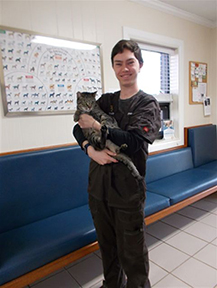HDI's Community Based Work Transition Program gives students with disabilities a more secure future (KY UCEDD)
November 30, 2015

|
It is important for all people to be able to enter the workforce and have a quality of life that makes them happy, regardless of any disability. The Human Development Institute's (HDI) Community Based Work Transition Program (CBWTP) assists those with disabilities in joining the workforce as they transition from high school to adult life. HDI's program is different from others of its kind by focusing on students with significant disabilities who require a personalized vocational service in order to obtain and maintain employment. The CBWTP can only exist as a collaboration amongst many different individuals, their families, social workers, and other programs, all working together to secure employment for these students. CBWTP is a career readiness program, and the staff works in partnership with the Kentucky Department of Education and Office of Vocational Rehabilitation. The CBWTP helps students translate the information and skills they learn in their classes to "real" jobs in their community through job exploration and development that leads to employment.
One of the requirements of the program is that both the student and their family must have expressed interest in the student gaining employment in order to be part of the program. The CBWTP works with students to find out what their true passions and interests are, and strives to place them in an appropriate position. Each student must have an Individualized Education Program (IEP) that outlines their vocational strengths and interests, and these are used to place students in a potential career, as opposed to settling for "job placements."
Through the CBWTP, a job coach works individually with each student to obtain employment before graduating high school. The job coach provides transition services to each student, who then have monthly reports, meeting summaries, and a career assessment report for documenting transition in the student's IEP. These updates are important to be sure that the potential career a student is matched with is one that plays to their individual strengths, preferences, interests, abilities, and needs. Job coaches attend trainings meant to help them understand the program and assist them in finding employment for their students. After these trainings, feedback is collected from the job coaches, and feedback is almost universally positive. "The workshop helped me better fit my students to sites that lined up with their long term goals, which lead to employment for some of the students," said one coach. Another coach expressed similar success, "I have had several students that were training in a daycare setting, and now have paid jobs in those areas of work. They are able to supervise and plan activities for small groups of their own. Also, I have had a student who is working in heating and air, electrical/plumbing, and now has a paid job being a tech working with the company."
Reports from the 2014-2015 school year have echoed these success stories, with nearly half (47%) of high school seniors and 15% of juniors enrolled in the program currently employed. Amongst these students who are employed, over 95% reported being happy with their jobs. Many students with disabilities have been able to realize their own skills and grow through the program, and job coaches have said that it's wonderful to see a student's skills come to life, and to see others who did not think these students could work rethink what they can really do.
The CBWTP staff collaborates with many different individuals, services, and organizations to bring a student with disability's employment goals to life. Success stories continue to be reported every day, and most importantly, it is the students who are finding the kinds of employment they want to do in order to attain the quality of life they deserve.







